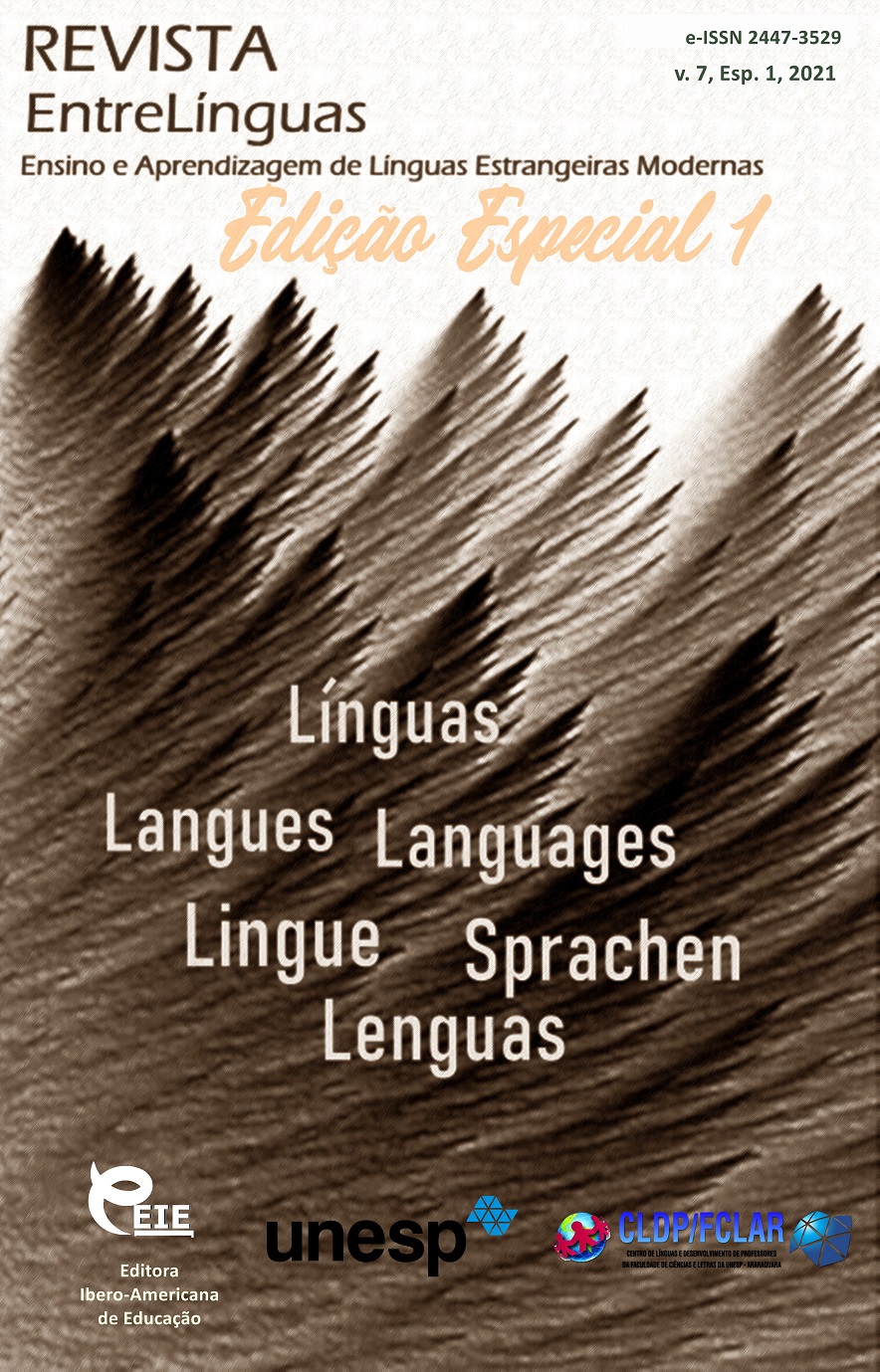Métodos de enseñanza interactivos como medio de la formación de competencias comunicativas en lengua extranjera de estudiantes universitarios
DOI:
https://doi.org/10.29051/el.v7iEsp1.14874Palabras clave:
Lengua extranjera, Competencia comunicativa, Tecnologías interactivas, Plataforma online, Métodos de enseñanza, Proceso educativo, Trabajo en equipoResumen
El artículo describe los aspectos más destacados en la creación de la capacidad de apertura de dialectos desconocidos mediante la utilización de estrategias de instrucción intuitiva. Se resuelven los rumores de desarrollar la habilidad informativa dialectal desconocida de los alumnos. La experimentación sobre las habilidades en la mejora de esta aptitud se realizó en base a la asociación entre miembros. Se propone un examen similar de los resultados en racimos de prueba y control. La rareza lógica del artículo es que retrata la idoneidad de la experiencia de utilizar la innovación participativa y el diseño de entretenimiento tecnológico en el escenario en línea en la creación de un dialecto desconocido para la aptitud informativa de los estudiantes suplentes.
Descargas
Citas
BALL, D. L.; THAMES, M. H.; PHELPS, G. Content knowledge for teaching what makes it special? Journal of teacher education, v. 59, n. 5, p. 389-407, 2008.
BARAHOVICH, I. I. Формирование коммуникативной компетентности студентов педагогического колледжа [The formation of communicative competence of students at pedagogical College]. PhD Candidate Thesis. Krasnojarsk, 2000.
BARTH, M. et al. Developing key competencies for higher education. International Journal of Sustainability in Higher Education, v. 8, n. 4, p. 416-430, 2007. DOI: https://doi.org/10.1108/14676370710823582
BLACK, P.; WILIAM, D. Assessment and classroom learning. Assessment in Education, v. 5, n. 1, p. 1-74, 1998. DOI: https://doi.org/10.1080/0969595980050102
BROADFOOT, P. Empowerment or performativity? English assessment policy in the late twentieth century. In: British Educational Research Association Conference University of Sussex at Brighton. Brighton: University of Sussex, 1999.
DOLZHIKOVA, A.; KURILENKO, V.; BIRYUKOVA, Y.; GLAZOVA, O.; ARZUMANOVA R. Translation-oriented reading of scientific-technical texts vs ordinary reading: psychological and psycholinguistic aspects. XLinguae, v. 11, n. 2, p. 24-33, 2018. DOI: https://doi.org/10.18355/xl.2018.11.02.03
GUZHELYA, D.; BIRYUKOVA, Y.; SHCHERBAKOVA, O; AKHNINA, K.; MASLOVA, I. Linguodidactic modelling in teaching foreign languages to bilingual children. Revista Espacios, v. 40, n. 8, p. 1-17. 2018.
HALL, K.; HARDING, A. Level descriptions and teacher assessment in England: towards a community of assessment practice. Educational research, v. 44, n. 1, p. 1-16. 2002. DOI: https://doi.org/10.1080/00131880110081071
JOHNSON, D. H.; JOHNSON, F. P. Joining together: Group theory and group skills. 12. ed. New Jersey: Prentice-Hall, 2017.
KAJUMOV, D. F. et al. The imagery of spiritual concepts in teaching process expressed by Phraseological units of the English, Tatar and Turkish languages. Man In India, v. 97, n. 3, p. 597-609, 2017.
KHAYRUTDINOV, R. R.; NIKOLAEVA, O. A.; KOZLOVA, J. A.; SOKOLOVA, I. I. Bilingual modality translation of American literature. European Research Studies Journal, v. 20 (Special Issue), p. 458-468, 2017.
LEE, S. J.; LIU, Y. E.; POPOVIC, Z. Learning individual behavior in an educational game: A data-driven approach. In: INTERNATIONAL CONFERENCE ON EDUCATIONAL DATA MINING, 7., 2014, Indianapolis. Proceedings […]. Indianapolis, Indiana: EDM, 2014. p. 114-121.
LESTER, S. Professional standards, competence and capability. Higher Education, Skills and Work-based Learning, v. 27, n. 7, p. 31-43, 2014. DOI:10.1108/HESWBL0420130005
MACSUGA GAGE, A. S. et al. Effective teaching practices for a positive classroom environment. Beyond Behavior, v. 22, n. 1, p. 14-22, 2012. DOI: https://doi.org/10.1177/107429561202200104
NARAG, R. M. Sojourning of foreign students at cagayan state university: a case of intercultural communicative competence 2016. (Unpublished Dissertation) – Cagayan State University, Tuguegarao City, 2016.
PODESTA, J.; PRITZKER, P.; MONIZ, E.; HOLDER, J.; ZENTS, J. Big data: seizing opportunities, preserving values. Washington, DC: Executive Office of the President, 2014. Available in: https://obamawhitehouse.archives.gov/sites/default/files/docs/20150204_Big_Data_Seizing_Opportunities_Preserving_Values_Memo.pdf. Access: 11 sep. 2019.
SALEH, S. E. Understanding Communicative Competence. University Bulletin, v. 3, n. 5, p. 101-110, 2013.
SPENCER-OATEY, H.; FRANKLIN, P. Intercultural interaction: A multidisciplinary approach to intercultural communication (research and practice in applied linguistics). Basingstoke: Palgrave Macmillan, 2009. DOI: https://doi.org/10.1057/9780230244511
TELEZHKO, I.; BIRYUKOVA, Y.; KURILENKO, V. A model for forming tolerance in profession-oriented text translators as part of the process of developing their socio-cultural competence. XLinguae, v. 12, n. 1, p. 116-124. 2019. DOI: https://doi.org/10.18355/XL.2019.12.01.09
TUGUSHEVA, E. Z. et al. Forming Anticorruption Competence Through Teaching a Professionally-oriented Language Course. Modern Journal of Language Teaching Methods, v. 8, n. 11, p. 429-436, 2018.
UKEssays. Communicative competence in language teaching. 2018. Available in: https://www.ukessays.com/essays/englishlanguage/communicativecompetenceinthelanguageclassroomenglishlanguageessay.php?vref=1. Access: 11 sep. 2019.
WINTHER, E.; KLOTZ, V. K. Spezifika der beruflichen Kompetenzdiagnostik — Inhalte und Methodologie. Zeitschrift für Erziehungswissenschaft, v. 7, n. 1, p. 9-32, 2014. DOI: 10.1007/s1161801304554
ZEER, E. F.; SYMANYUK, E. E. Реализация компетентностного подхода в системе инновационного образования [Realization of the competencebased approach in the system of innovative education]. Innovacionnye proekty i programmy v obrazovanii, v. 4, p. 15-20, 2014.
Descargas
Publicado
Cómo citar
Número
Sección
Licencia

Esta obra está bajo una licencia internacional Creative Commons Atribución-NoComercial-CompartirIgual 4.0.
Os manuscritos aceitos e publicados são de propriedade da Revista EntreLínguas. Os artigos publicados e as referências citadas na Revista EntreLínguas são de inteira responsabilidade de seus autores.
Transferência de direitos autorais – autorização para publicação
Caso o artigo submetido seja aprovado para publicação, já fica acordado que o(s) autor(es) autoriza(m) a UNESP a reproduzi-lo e publicá-lo na EntreLínguas, entendendo-se os termos “reprodução” e “publicação” conforme definição respectivamente dos incisos VI e I do artigo 5° da Lei 9610/98. O artigo poderá ser acessado pela rede mundial de computadores (Internet), sendo permitidas, a título gratuito, a consulta e a reprodução de exemplar do artigo para uso próprio de quem a consulta, desde que haja a citação ao texto consultado. Essa autorização de publicação 328 EntreLínguas, Araraquara, v. 1, n .2, p. 323-328, jul./dez. 2015 não tem limitação de tempo, ficando a UNESP responsável pela manutenção da identificação do(s) autor(es) do artigo. Os artigos publicados e as referências citadas na Revista EntreLínguas são de inteira responsabilidade de seus autores.











